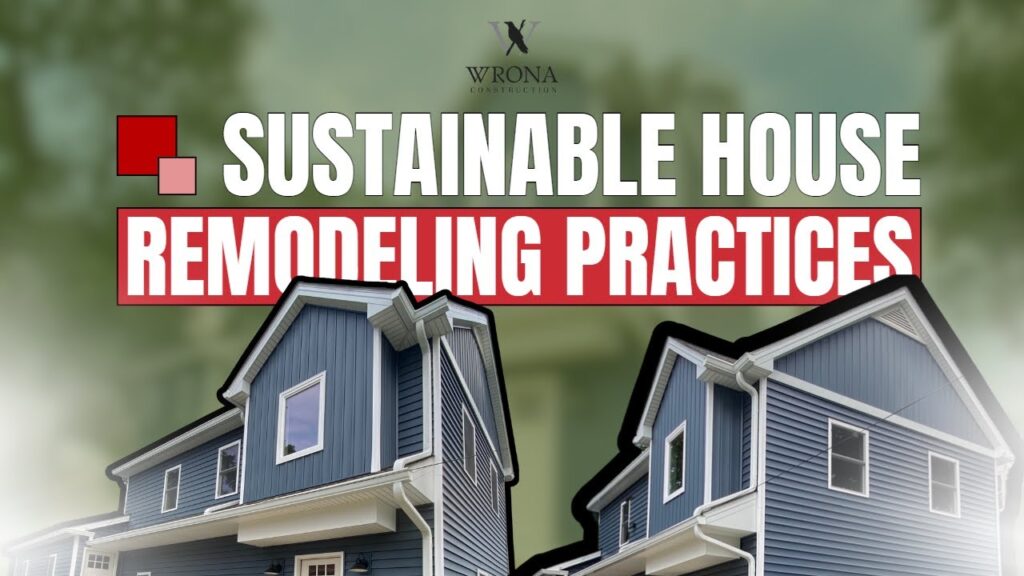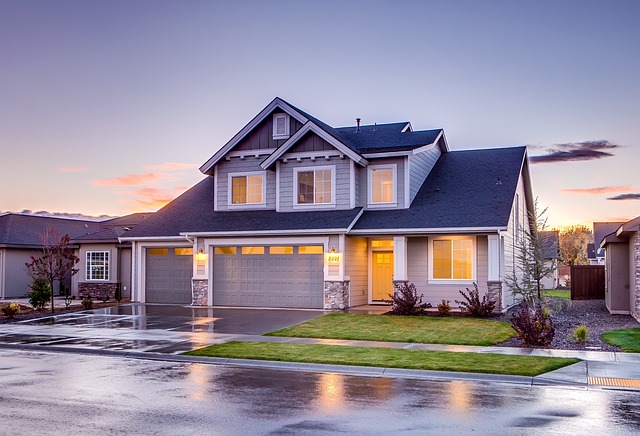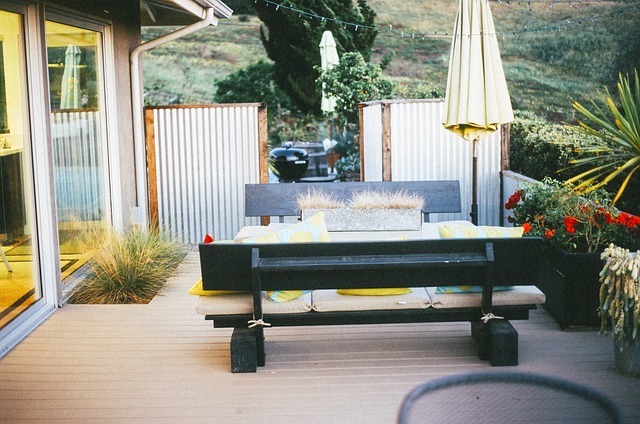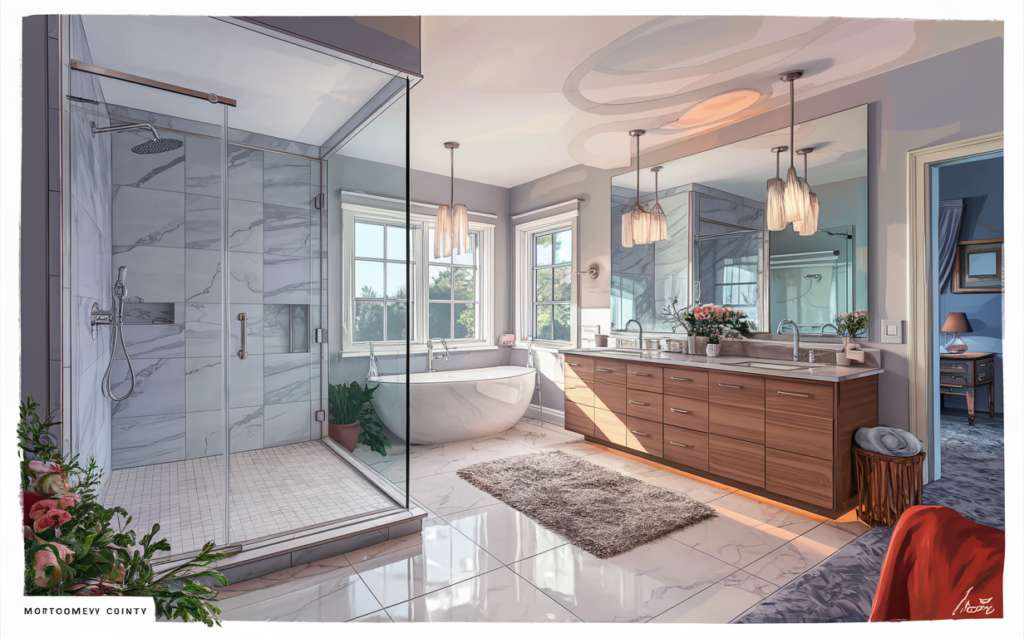
Discover Sustainable Remodeling Practices in Montgomery County to enhance energy efficiency, reduce waste, and create eco-friendly homes.
Sustainable remodeling practices are becoming increasingly popular in Montgomery County, Pennsylvania. These methods focus on reducing environmental impact while improving home efficiency and comfort. By incorporating eco-friendly materials, energy-saving techniques, and waste-reduction strategies, homeowners can create beautiful, functional spaces that align with their values and benefit the planet.
Montgomery County residents are increasingly seeking ways to make their homes more environmentally friendly. This trend reflects a growing awareness of climate change and a desire to reduce personal carbon footprints. Sustainable Remodeling Practices offers a practical way for homeowners to contribute to environmental conservation while enhancing their living spaces.
Green remodeling practices in Montgomery County often focus on improving energy efficiency, conserving water, and using eco-friendly materials. These approaches not only benefit the environment but can also lead to significant cost savings for homeowners over time.

One of the most effective sustainable remodeling practices is improving a home’s energy efficiency. In Montgomery County’s climate, where summers can be hot and humid and winters cold, proper insulation and efficient HVAC systems are crucial.

Upgrading insulation is a key step in creating an energy-efficient home. Many older homes in Montgomery County lack adequate insulation, leading to higher energy bills and uncomfortable living conditions. Adding insulation to walls, attics, and crawl spaces can significantly reduce heating and cooling costs.
Replacing old, drafty windows with energy-efficient models is another important aspect of sustainable remodeling. Double or triple-pane windows with low-E coatings can help maintain comfortable indoor temperatures year-round, reducing the load on HVAC systems.
Installing smart thermostats allows homeowners to optimize their heating and cooling schedules, potentially saving hundreds of dollars annually on energy bills. These devices can learn household routines and adjust temperatures accordingly, ensuring comfort while minimizing energy waste.
Water conservation is a growing concern in many parts of the country, including Montgomery County. Sustainable remodeling practices can help reduce water consumption and protect this valuable resource.
Installing low-flow faucets, showerheads, and toilets can dramatically reduce household water use. These fixtures maintain adequate water pressure while using significantly less water than traditional models.
Implementing rainwater harvesting systems is gaining popularity in Montgomery County. These systems collect rainwater from roofs and store it for use in irrigation or non-potable household applications, reducing demand for municipal water supplies.
When remodeling extends to outdoor spaces, consider incorporating drought-resistant plants native to Pennsylvania. These plants require less water and maintenance, creating beautiful, sustainable landscapes that support local ecosystems.
Choosing environmentally friendly materials is a crucial aspect of sustainable remodeling. Montgomery County homeowners have a wide range of options for incorporating eco-friendly materials into their projects.
Using reclaimed wood for flooring, cabinetry, or decorative elements adds character to a home while reducing demand for new lumber. Many local suppliers in Montgomery County offer a variety of reclaimed wood options.
Countertops made from recycled glass are durable, attractive, and environmentally friendly. These surfaces can add a unique touch to kitchens and bathrooms while diverting glass from landfills.
Choosing paints and finishes with low volatile organic compounds (VOCs) improves indoor air quality and reduces environmental impact. Many local paint stores in Montgomery County now offer a wide selection of low-VOC options.
Improving indoor air quality is an often overlooked aspect of sustainable remodeling practices. Poor indoor air quality can lead to health issues and discomfort for occupants.

Installing effective ventilation systems, particularly in kitchens and bathrooms, helps remove indoor air pollutants and excess moisture. This can prevent mold growth and improve overall air quality.
Incorporating whole-house air filtration systems can significantly improve indoor air quality, especially for those with allergies or respiratory issues. These systems remove dust, pollen, and other airborne particles from the home’s air.
Using natural, non-toxic materials in remodeling projects can help reduce indoor air pollution. Materials like bamboo flooring, wool carpeting, and natural stone are beautiful options that don’t off-gas harmful chemicals.
Proper waste management during remodeling projects is essential for minimizing environmental impact. Montgomery County offers several resources for responsible waste disposal and recycling.
When possible, opt for deconstruction rather than demolition. This process allows for the salvage of reusable materials, reducing waste and potentially providing materials for other local projects.
Many materials from remodeling projects can be recycled. Work with contractors who prioritize recycling and are familiar with Montgomery County’s recycling facilities and requirements.
Consider donating usable materials removed during remodeling to local non-profit organizations. This keeps these items out of landfills and supports community initiatives.
Upgrading lighting is a simple yet effective sustainable remodeling practice. Energy-efficient lighting can significantly reduce electricity consumption while improving the ambiance of a home.

Replacing old incandescent bulbs with LED lights can lead to substantial energy savings. LEDs last longer, use less energy, and are available in a variety of colors and styles to suit any home design.
Designing remodeling projects to maximize natural light can reduce the need for artificial lighting during the day. Consider adding skylights or larger windows where appropriate to bring more daylight into the home.
Implementing smart lighting systems allows for greater control over home lighting. These systems can be programmed to adjust based on time of day or occupancy, further reducing energy waste.
Sustainable remodeling practices shouldn’t stop at the front door. Sustainable landscaping techniques can enhance a home’s environmental benefits and create beautiful outdoor spaces.

Creating gardens with plants native to Pennsylvania can reduce water consumption and provide habitat for local wildlife. Many native plants are well-adapted to Montgomery County’s climate and require minimal maintenance.
When remodeling driveways or patios, consider using permeable paving materials. These allow rainwater to seep into the ground, reducing runoff and helping to recharge local groundwater supplies.
Incorporating a composting area into landscape designs provides a sustainable way to manage yard waste and kitchen scraps. The resulting compost can nourish gardens and reduce the need for chemical fertilizers.
Using locally sourced materials and working with local contractors is important to sustainable remodeling practices. This practice reduces transportation emissions and supports the local economy.
Montgomery County and surrounding areas offer a variety of locally produced building materials, from stone to wood products. Using these materials reduces transportation costs and emissions while supporting local businesses.
Incorporating the work of local artisans and craftspeople into remodeling projects adds unique character to homes while supporting the local arts community. This could include custom cabinetry, metalwork, or decorative elements.
Working with local contractors and suppliers who are familiar with Montgomery County’s climate, building codes, and sustainability practices can lead to more successful and environmentally friendly remodeling projects.
Replacing old appliances with energy-efficient models is a key component of sustainable remodeling. Modern, energy-efficient appliances can significantly reduce a home’s energy consumption.
When selecting new appliances, look for the ENERGY STAR certification. These appliances meet strict energy efficiency guidelines set by the U.S. Environmental Protection Agency and the Department of Energy.
Consider incorporating smart appliances into your remodeling project. These devices can be controlled remotely and often include features that optimize energy use based on household patterns.
For kitchen remodels, consider induction cooktops. These are more energy-efficient than traditional electric or gas stoves and offer precise temperature control for cooking.
Upgrading heating and cooling systems is often a significant part of sustainable remodeling practices projects in Montgomery County. Modern, efficient systems can dramatically reduce energy consumption and improve home comfort.
Heat pumps are becoming increasingly popular in Montgomery County due to their efficiency in both heating and cooling. They work well in the area’s climate and can significantly reduce energy costs compared to traditional HVAC systems.
For new construction or major renovations, consider radiant floor heating. This system is highly efficient and provides comfortable, even heat throughout the home.
While more expensive upfront, geothermal heating and cooling systems can provide significant long-term energy savings. They use the stable temperature of the earth to heat and cool homes efficiently.
The roof is a critical component of a home’s energy efficiency and environmental impact. When remodeling, consider sustainable roofing options that can improve energy performance and reduce environmental impact.
Cool roofing materials reflect more sunlight and absorb less heat than standard roofs. This can significantly reduce cooling costs in summer, a benefit in Montgomery County’s warm summers.
For flat or low-slope roofs, consider installing a green roof. These living roofs provide insulation, reduce stormwater runoff, and can create additional outdoor living space.
Solar tiles or shingles integrate seamlessly with traditional roofing materials while generating clean energy. This option is becoming more popular and affordable in Montgomery County.
Water heating can account for a significant portion of a home’s energy use. Sustainable remodeling practices often include upgrading to more efficient water heating systems.
Tankless or on-demand water heaters provide hot water only as needed, eliminating the energy waste associated with keeping a tank of water hot at all times.
Solar water heating systems can be an excellent option in Montgomery County, providing a significant portion of a home’s hot water needs using clean, renewable energy.
These systems use heat pump technology to heat water more efficiently than traditional electric water heaters, potentially saving homeowners hundreds of dollars annually on water heating costs.
Flooring is a major component of any remodeling project, and there are many sustainable options available to Montgomery County homeowners.
Bamboo is a fast-growing, renewable resource that makes for durable and attractive flooring. It’s available in a variety of colors and styles to suit different home designs.
Cork is another renewable resource that makes for comfortable, insulating flooring. It’s naturally antimicrobial and can help reduce noise transmission between floors.
Using reclaimed wood for flooring not only reduces demand for new lumber but also adds character and history to a home. Many local suppliers in Montgomery County offer reclaimed wood flooring options.
Incorporating smart home technology can enhance the sustainability of remodeling projects by optimizing energy and water use.
Smart power strips can automatically cut power to devices that aren’t in use, reducing standby power consumption and saving energy.
Motorized blinds or shades can be programmed to adjust based on the time of day or sunlight levels, helping to regulate indoor temperatures and reduce heating and cooling needs.
Smart water leak detection systems can alert homeowners to leaks early, preventing water waste and potential damage to the home.
The kitchen is often a focus of remodeling projects, and there are many opportunities to incorporate sustainable practices in this high-use area of the home.

Choose ENERGY STAR-certified refrigerators, dishwashers, and other kitchen appliances to reduce energy consumption.
Consider countertops made from recycled materials, sustainably harvested wood, or locally quarried stone to reduce environmental impact.
Install water-efficient faucets with aerators to reduce water use without sacrificing functionality.
Bathrooms are another area where sustainable remodeling can have a significant impact, particularly in terms of water conservation.

Dual-flush toilets allow users to choose between a full or partial flush, significantly reducing water use compared to traditional toilets.
Consider installing a greywater system that reuses water from sinks and showers for toilet flushing or landscape irrigation.
Replace old bathroom lighting with energy-efficient LED fixtures to reduce electricity use and improve lighting quality.
When adding on to a home, it’s important to consider sustainability from the ground up.
Orient new additions to take advantage of natural light and heat from the sun, reducing the need for artificial lighting and heating.
Ensure new additions are well-insulated and air-sealed to maximize energy efficiency.
Consider advanced framing techniques that use less lumber and allow for more insulation, improving the energy efficiency of the new space.
Many Montgomery County homeowners are interested in sustainable remodeling but are concerned about costs. Fortunately, there are several financing options available to help make these projects more affordable.
These mortgages allow homeowners to finance energy-efficient improvements as part of their home purchase or refinance.
Check for local incentives or rebates for energy-efficient upgrades. Many utility companies and local governments offer programs to encourage sustainable home improvements.
Some energy-efficient home improvements may qualify for federal tax credits, helping to offset the cost of sustainable remodeling projects.
Sustainable remodeling practices not only benefit the environment but can also increase a home’s value. Many buyers in Montgomery County are willing to pay a premium for homes with energy-efficient features and sustainable materials.
Highlight energy-efficient upgrades when selling a home. Features like solar panels, high-efficiency HVAC systems, and quality insulation can be major selling points.
Consider obtaining energy efficiency certifications or ratings for your home after remodeling. These can provide concrete evidence of a home’s performance to potential buyers.
Emphasize the long-term cost savings associated with sustainable features when marketing a remodeled home. Lower utility bills and reduced maintenance needs can be attractive to buyers.
Choosing the right professionals is crucial for successful sustainable remodeling projects in Montgomery County.
Seek out contractors and designers with certifications in green building practices, such as LEED accreditation or certification from the National Association of Home Builders’ Green Building Program.
Ask for references from previous sustainable remodeling projects and follow up with those homeowners about their experiences.
Communicate your sustainability goals with potential contractors and ensure they have experience implementing the specific practices you’re interested in.
| Sustainable Remodeling Practice | Potential Energy Savings | Estimated Cost Range |
|---|---|---|
| LED Lighting Upgrade | 75-80% over incandescent | $200 – $1,000 |
| ENERGY STAR Appliances | 10-50% depending on type | $500 – $3,000+ |
| Improved Insulation | 15-20% on heating/cooling | $1,500 – $5,000 |
| Low-Flow Water Fixtures | Up to 60% on water use | $200 – $1,000 |
| Smart Thermostat Installation | 10-15% on heating/cooling | $200 – $500 |
| Sustainable Material | Environmental Benefit | Durability Rating (1-10) |
|---|---|---|
| Bamboo Flooring | Rapidly renewable | 8 |
| Recycled Glass Tiles | Reduces landfill waste | 9 |
| Cork Flooring | Renewable, biodegradable | 7 |
| Reclaimed Wood | Reduces deforestation | 9 |
| Low-VOC Paint | Improves air quality | 8 |
Discover Sustainable Remodeling Practices in Montgomery County to enhance energy efficiency, reduce waste, and create eco-friendly homes. For more information, you can visit our website or contact us.
